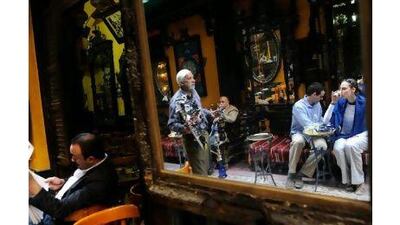CAIRO // The number of tourists coming to Egypt fell by 80 per cent last month from the same period last year after tour operators cancelled trips and foreign embassies issued travel warnings in the wake of the uprising, says a top government official.
"We've been hit very bad," says Mounir Fakhry Abdel Nour, who was appointed as tourism minister on February 20 during the widespread shake-up of the government following the resignation of Hosni Mubarak, the president, just weeks earlier. "But I'm confident that before the end of March, we'll be on track again."
The spending power of millions of visitors to the country's panoply of historic sites such as the pyramids in Giza and the treasures of the Museum of Egyptian Antiquities account for 11.5 per cent of GDP. Even more important is the role of tourism in employment, with about one out of every seven jobs directly or indirectly connected to the industry, Mr Nour said.
The Egyptian economy has slowed dramatically, as protests and strikes hamper businesses and the stock market remains shut. The investment bank EFG-Hermes, based in Cairo, predicted a 3 per cent reduction in Egypt's GDP this year, down from its previous forecast of 6 per cent, immediately after the uprising.
The effect of the troubles on tourism can be readily be seen in the alleyways of the Khan al Khalili, Cairo's most famous souq. Just a smattering of tourists have been trickling through in recent weeks, a stark contrast to the barrage of tour buses that usually unload thousands of visitors on an average weekend.
At Fishawi Coffee shop, nestled inside the market, business has plummeted, says Ashraf el Fishawi, the owner. On an average day, he now sees 10 or so tourists come to have a drink and shisha, compared with an average of 500 visitors in early January. He has had to cut his staff by half to 10.
"Every day we had tourists from Italy, Spain, France, all the world," he says. "Now, it's very little."
Just around the corner from Fishawi, the manager of a little trinket store says he hasn't seen tourism drop so sharply since the Luxor massacre in November 1997 when 62 people were killed by Islamic militants. "I haven't sold anything in weeks," says Muharram Mahmoud, 28, from Aswan. Meanwhile, hotel occupancy rates have dropped to the single digits - especially in the seaside resort of Sharm el Sheikh.
Purveyors of cheap papyrus paintings and trinkets have despaired as sales have plummeted.
But some visitors have decided to travel anyway, ignoring their governments' warnings about safety. Sam Minot, 24, and Kirsten von der Veen, 25 - both graduate students at the University of Pennsylvania - arrived this week for a 10-day trip to Cairo and surrounding areas. "It's been great," said Ms von der Veen, whose brother lives in Cairo. "We were at the pyramids today, there was no one else there."
The Egyptian government, for its part, is trying hard to restore the image of the country abroad. Mr Nour is travelling to Berlin and Russia this week to attend tourism events and spread the message that the country is ready to receive tourists again.
Russia is expected to remove its recommendation not to travel to Egypt within a few days, he said.
"We are trying to launch some incentive packages for chartered tours," Mr Nour said. "We are waiving some airport fees or reducing airport fees for charters, as well as giving some guarantees or break-even points for covering the charter costs." The situation may be grim, but there is one new attraction in Egypt that could offset the losses: people-power tourism.
"There's an added reason to visit Egypt: to see those beautiful people who have inspired the world with their peaceful revolution," Mr Nour said.

